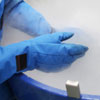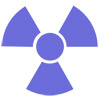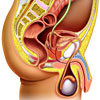Prostate Cancer Treatment
- Prostate cancer treatments: How do I choose?
- Treatment options
- Cryotherapy for prostate cancer
- High intensity focused ultrasound (HIFU)
- Day surgery transurethral resection of the prostate (DSTURP)
- Radical prostatectomy
- Radical perineal prostatectomy (RPP)
- Robotic radical prostatectomy
- Video: Robotic radical prostatectomy
- Radiotherapy for prostate cancer
- Biological therapy (Biotherapy)
- Rehabilitation after prostate cancer treatment
Prostate cancer treatments: How do I choose?
 | Treatments for prostate cancer include surgery, hormonal therapy, radiotherapy and high intensity focused ultrasound. Factors influencing which treatment is chosen include type of cancer, age and concerns about side effects. |
For more information, see Prostate Cancer Treatments: How Do I Choose?
Treatment options
Cryotherapy for prostate cancer
 | Cryotherapy is a relatively new therapeutic procedure, recognised in 1996 as an effective treatment for prostate cancer. Cryotherapy or cryosurgery is based on the principles of using low temperature gases to freeze abnormal and diseased cells. |
For more information, see Cryotherapy for Prostate Cancer.
High intensity focused ultrasound (HIFU)
 | HIFU represents the next generation of minimally invasive treatments for early, localised prostate cancer. A probe inserted into the area through the rectum gives out a beam of ultrasound, which is focused to heat and destroy the cancerous prostate tissue, causing the affected cells to die. |
For more information, see High Intensity Focused Ultrasound (HIFU).
Day surgery transurethral resection of the prostate (DSTURP)
 | Transurethral resection of the prostate (TURP) involves using a thin tube, passed up through the urethra, to see and remove a bladder obstruction. The length of time spent in the hospital after the operation has been considerably reduced over the years, and recent attention has been given to TURP performed as day surgery. |
For more information, see Day Surgery Transurethral Resection of the Prostate (DSTURP).
Radical prostatectomy
 | Radical prostatectomy is a surgical procedure that involves the removal of the prostate gland and the attached seminal vesicles. Lymph nodes near the prostate can be removed during the same procedure. This is one option for men with localised prostate cancer. |
For more information, see Radical Prostatectomy.
Radical perineal prostatectomy (RPP)
 | A radical perineal prostatectomy is a surgical procedure to completely remove the prostate from a small incision in the perineum. Surgical removal of the prostate is carried out on men with organ-confined prostate cancer. |
For more information, see Radical Prostatectomy.
Robotic radical prostatectomy
 | Laparoscopic surgery, also known as ‘keyhole surgery‘, involves the use of cameras and surgical instruments being placed through small holes in the body wall. Sometimes laparoscopic instruments are held by the surgeon, but in robotic prostate surgery, the surgeon controls them with a highly advanced computer system. |
For more information, see Robotic Radical Prostatectomy.
Video: Robotic radical prostatectomy
 | Radical prostatectomy is a surgical treatment for prostate cancer. Dr Laurence Harewood discusses the advantages of robotic radical prostatectomy over conventional open surgery.Watch the video Robotic Radical Prostatectomy. |
Radiotherapy for prostate cancer
 | Radiotherapy is a form of treatment that is used to treat cancer of the prostate gland. It may be used alone or in conjunction with surgery. Radiotherapy involves the use of radiation which is targeted to the cancer site in order to destroy cancerous cells. |
For more information, see Radiotherapy for Prostate Cancer.
Biological therapy (Biotherapy)
 | Biological therapy, or biotherapy, immunotherapy or biological response modifiers, are gaining increasing prominence as anti-cancer agents. They may be used either alone or in combination with traditional anti-cancer treatments such as chemotherapy. |
For more information, see Biological therapy (Biotherapy).
Rehabilitation after prostate cancer treatment
 | During the recovery period after prostate cancer treatment, there should be a comprehensive rehabilitation plan combined with appropriate emotional and psychological support. A multi disciplinary approach is preferable, involving a urologist, a physiotherapist experienced in the management of male urinary incontinence, and a psychologist adept at couples, cancer and sexual dysfunction counselling. |
For more information, see Rehabilitation After Prostate Cancer Treatment.
More information
 | For more information on prostate cancer, including diagnoses, types of treatments, and some useful tools, videos and animations, see Prostate Cancer. |
Dates
Tags
Created by:

 Login
Login














